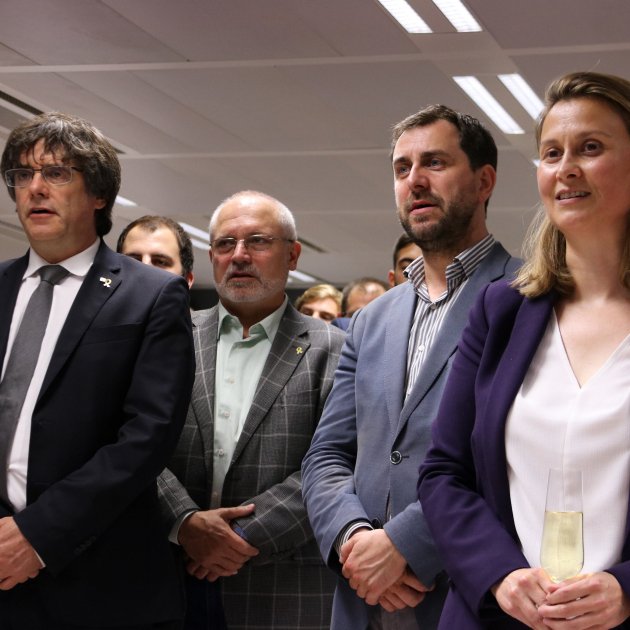The Catalan exile body, Council for the Republic, has released a statement denouncing the state repression that has been "the only response" by Spain in the almost two years since Catalonia's 2017 independence referendum and proposing the creation of a "negotiation platform" with the Spanish state, which would include mediators.
The platform proposed by the Council would include "independent mediation of the negotiations" and would be based on the "recognition by the [Spanish] state of the right to self-determination" as exercised at the 2017 referendum as well as "the ending of the repression and the complete respect for civil and political rights".
The declaration by the pro-independence Council, led by Carles Puigdemont and other Catalan politicians in exile, comes in the approach to the second anniversary of the October 1st referendum - a vote in which, says the statement, Catalonia was exercising a right to self-determination which is recognised in international treaties.
The Belgium-based Council recalls that the independence movement "has always appealed to dialogue and negotiation" to solve the political conflict, which it considers to have been "systematically ignored and disdained by all Spanish governments." Despite this, the Council reiterates Catalonia's "willingness to engage in dialogue".
Translation:
"The Government Council of @ConsellxRep urges civil society and the Catalan institutions to prepare the necessary measures and actions to put into effect the mandate derived from the independence referendum held on October 1st, 2017." - Council for the Republic
Call to get ready
With its eyes on Catalonia, the Council also urges civil society and institutions to "ready the necessary measures and actions to put into effect the popular mandate for independence" achieved in the 2017 referendum. In this regard, the body asks the "people of Catalonia" to support their institutions through the "exercise of essential civil rights" and non-violent civil disobedience.
In addition, the Council for the Republic considers that, "as long as the mandate derived from the referendum has not been fully put into effect," any elections to the Parliament of Catalonia will have "the character of a referendum".
The statement ends with a call to European and international institutions to "ensure that human rights are guaranteed."
Puigdemont: "If it doesn't work, we won't abandon self-determination"
In comments to Catalan public television, exiled president Carles Puigdemont defended the proposal as a "clear platform" that would help to avoid falling into the idea of "abstract dialogue." He also warned people that they should get ready, referring to the "lessons in October."
"A time will come when, if dialogue and negotiation are not working, we won't abandon our right to self-determination," he warned.
Full statement
Below is an English translation of the Council for the Republic's statement:
"On October 1st, two years will have passed since the people of Catalonia exercised their right to self-determination and decided to establish an independent state in the form of a republic. The exercise of this right, recognized in the International Covenant for Civil and Political Rights, ratified by Spain and incorporated into the Spanish Constitution of 1978, was interfered with by the violence and repression of the Spanish state, which tried to prevent it. The determination of the legitimate institutions of Catalonia and of its people prevented the state from achieving its goal.
It will also be two years since the start of the strategy of repression from the powers of the state, from the Head of State himself to the courts that have tried our political and social leaders, as the only response to the aspirations of the people of Catalonia. In two years of repression, hundreds of people have been detained, forced into exile and judicially prosecuted.
The entire independence movement has always appealed to dialogue and negotiation to solve the political conflict. This appeal, with the support of the vast majority of the people of Catalonia, regardless of the preference they may have for the country's future status, has been systematically ignored and disdained by all Spanish governments. Today, despite the repression, we are still ready for dialogue.
After another massive demonstration on this year's Diada, the Catalan National Day, and with the court verdict on our political and social leaders about to be delivered, the governing council of the Council for the Republic, meeting in Waterloo on September 12th, 2019, has agreed to make public the following conclusions of its internal debate:
To propose to the state a negotiation platform for the resolution of the conflict based on the following framework:
- The recognition by the state of the right to self-determination, which the Catalan people exercised on October 1st, 2017.
- The reversal of the repression and the complete respect for civil and political rights, as these are recognized under international law.
- Independent mediation of the negotiations.
The action by the institutions and civil society to materialize the right to self-determination cannot be blocked, either by repression, or by the refusal of the majority of political forces and Spanish institutions to engage in dialogue.
In accordance with our mission to put into effect the mandate derived from the independence referendum on October 1, 2017, the Council:
1.1. Urges Catalonia's civil society and institutions to ready the measures and actions necessary to put into effect the popular mandate for independence.
1.2. Will call on the people of Catalonia to mobilize to accompany the action of the Catalan institutions to put this mandate into effect, exercising the civil rights which are essential in a consolidated democratic system, as well as civil disobedience when necessary, always within the framework of non-violent struggle.
1.3. Considers that as long as the mandate derived from the referendum has not been fully put into effect, any election to the [Catalan] Parliament, as the depositary of the sovereignty of the people of Catalonia, will have the character of a referendum.
2. We call on the European and international institutions, and particularly the European Union, in accordance with the obligations deriving from its Treaties, to ensure that human rights are guaranteed.
Waterloo, 14th September, 2019"
